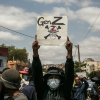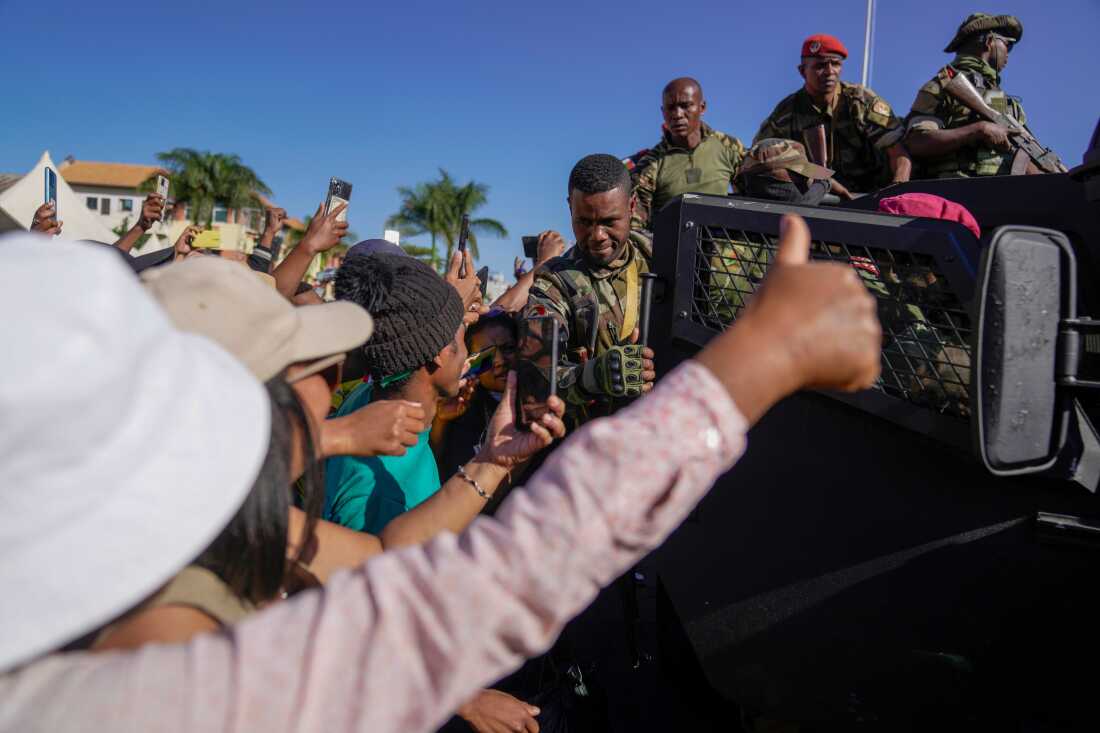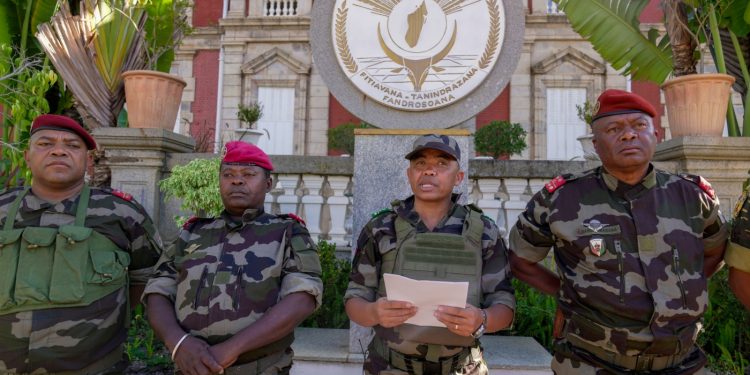CAPSAT military unit commander Col. Michael Randrianirina, center, reads a statement saying the armed forces are taking control of the country from the steps of the presidency in Antananarivo, Madagascar, Tuesday, Oct. 14, 2025.
Brian Inganga/AP
hide caption
toggle caption
Brian Inganga/AP
JOHANNESBURG, South Africa — Madagascar’s army seized power Tuesday, days after the president went into hiding, saying he feared for his life following weeks of massive anti-government protests.
Colonel Michael Randrianirina, of the elite military unit CAPSAT, announced that the army controlled the African island nation and would establish a committee made up of senior army and police officers. He said they would then “quickly” establish a civilian government.

His statement came just minutes after MPs voted to impeach President Andry Rajoelina for abandoning his post after he reportedly fled the country over the weekend. On Monday, Rajoelina broadcast a speech on social media claiming he was hiding in an undisclosed location.
The impeachment vote – which received 130 yes votes and one blank vote – went ahead even though Rajoelina took steps the same day to prevent it by dissolving the lower house of parliament.

This screenshot from a video released Monday, October 13, 2025, shows Madagascar President Andry Rajoelina delivering a speech from an unknown location after an apparent coup attempt forced him into hiding.
Presidency of the Republic of Madagascar/AP
hide caption
toggle caption
Presidency of the Republic of Madagascar/AP
After the military’s takeover was announced, a statement posted on the official Facebook page of the Malagasy presidency denounced what it called “a coup d’état” and insisted that Rajoelina remained in charge.
“Generation Z” protests
Malagasy youth took to the streets of the capital Antananarivo last month in so-called “Generation Z” protests demanding Rajoelina’s resignation, amid anger over water and electricity shortages crippling the country. NPR spoke with protesters who said they haven’t had tap water in six years, even though they continue to pay for water.
Over the weekend, the CAPSAT military unit announced that it had sided with the protesters and would not take any action to suppress the demonstrators, calling them “our brothers, our sisters.”
Rajoelina then fled, apparently aboard a French plane, although this has not been confirmed, while some of his officials reportedly fled to Mauritius.
The former French colony in the Indian Ocean, off the coast of East Africa, is no stranger to rebellions. Rajoelina himself came to power in a 2009 coup – with the help of the same military unit that just overthrew him – but then ran for office twice and won.

Malagasy people have since turned bitter against the 51-year-old leader, accusing his government of poor service delivery and corruption in this impoverished country of some 31 million people.
The baby-faced president tried to appease protesters by dismissing his government, but they continued to demand his resignation. The United Nations says more than 20 people have been killed during the protests and authorities have used deadly force.

Troops loyal to the commander of the CAPSAT military unit, Colonel Michael Randrianirina, march to the presidency to announce that the armed forces are taking control of the country in Antananarivo, Madagascar, Tuesday, October 14, 2025.
Brian Inganga/AP
hide caption
toggle caption
Brian Inganga/AP
The army appears to be working to ensure the takeover is not seen as a coup, and some Malagasy people who demonstrated said they welcomed the military intervention that helped get rid of Rajoelina.
“The military is the only neutral institution that can get us back on track,” Sariaka, one of the protesters, told NPR. Asked if she would call it a coup, she replied: “For me it is a popular revolution supported by a military unit.”
Fanilo, a 21-year-old medical student, feels the same way. “We are all deeply relieved and even delighted at his dismissal,” he said. “We are no longer oppressed.”
When asked if he was not concerned about the military taking power, Fanilo said: “not really because the current military leadership is in very good hands… especially since they plan to then return power to a civilian government.”









